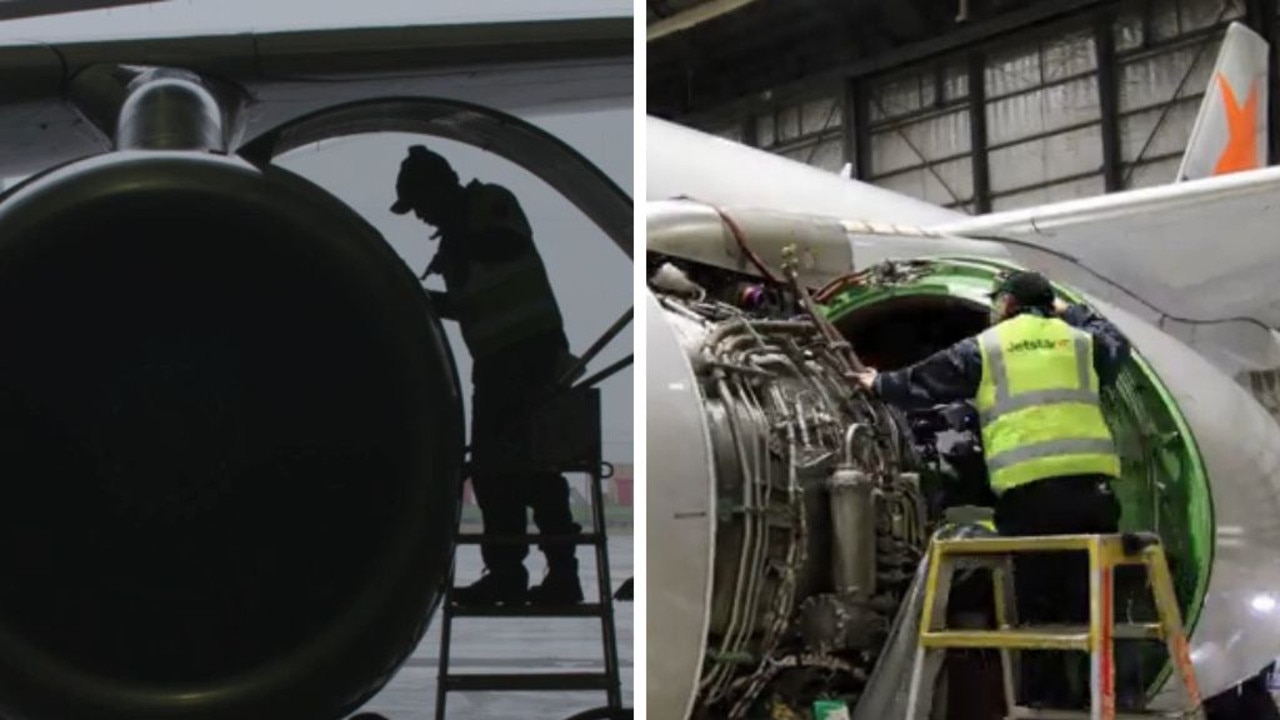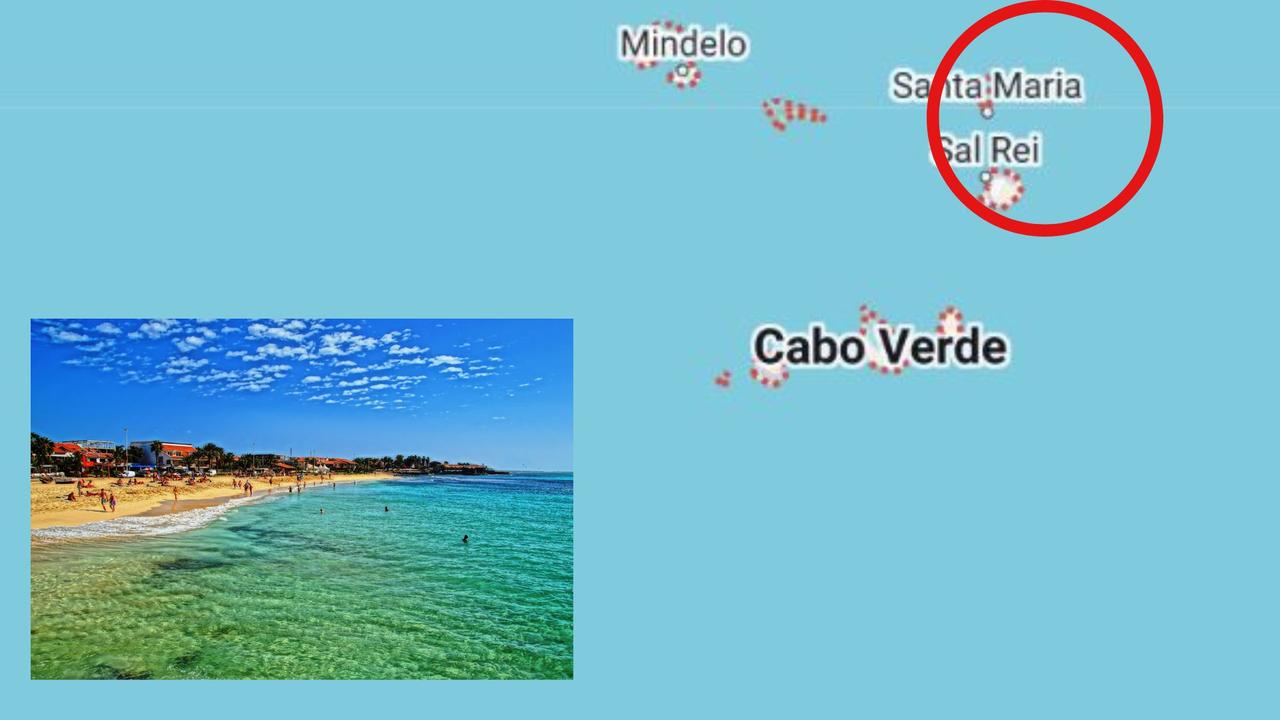Virgin Australia: Airline goes into administration
Administrators for Virgin Australia say more than 10 parties have flagged interest in helping resurrect the struggling airline.
More than 10 parties have flagged “keen interest” in helping to save Virgin Australia, its administrators say, as the airline’s boss vows it will continue to operate in the meantime.
The troubled airline announced today accounting firm Deloitte had been appointed as administrators to help it restructure amid a debt pile of $5 billion and a collapsed cash flow due to the coronavirus crisis.
About 16,000 jobs are left in limbo, however the administrators say there are no plans for redundancies.
“This is a tough day for our airline … (but) we’re certainly not collapsing,” Virgin Australia chief executive Paul Scurrah said.
RELATED: Why a Virgin Australia collapse would screw us all
RELATED: What does this mean for my Velocity points?
The airline’s decision comes after the Federal Government refused a $1.4 billion bailout to help the airline survive the pandemic.
Mr Scurrah said COVID-19 had triggered the worst aviation crisis in history.
“The events of the past 24 hours have been incredibly challenging for the wonderful people of the Virgin Australia Group,” he said at a press conference this morning.
“It has been a necessary decision made by our board, brought on by an unprecedented global pandemic, COVID-19. This is not just something that is hurting Virgin Australia. We know it’s hurting the industry globally and is the worst aviation crisis we’ve ever seen in our history. We’re not immune to that.
“Our board made a very courageous decision last night to put the company into voluntary administration and do so quickly, with the intent of working with our administrator, Deloitte, to come through and be as strong as we possibly can on the other side of this crisis.”
He added: “We’ll come back leaner, stronger and fitter, and play our role in making sure that the economy of Australia – which is currently devastated by the impact of COVID-19 – recovers as quickly as it possibly can for all Australians.”
Virgin Australia employs about 10,000 people directly and supports about 6000 other jobs indirectly.
Mr Scurrah said the company was working to preserve as many jobs as possible.
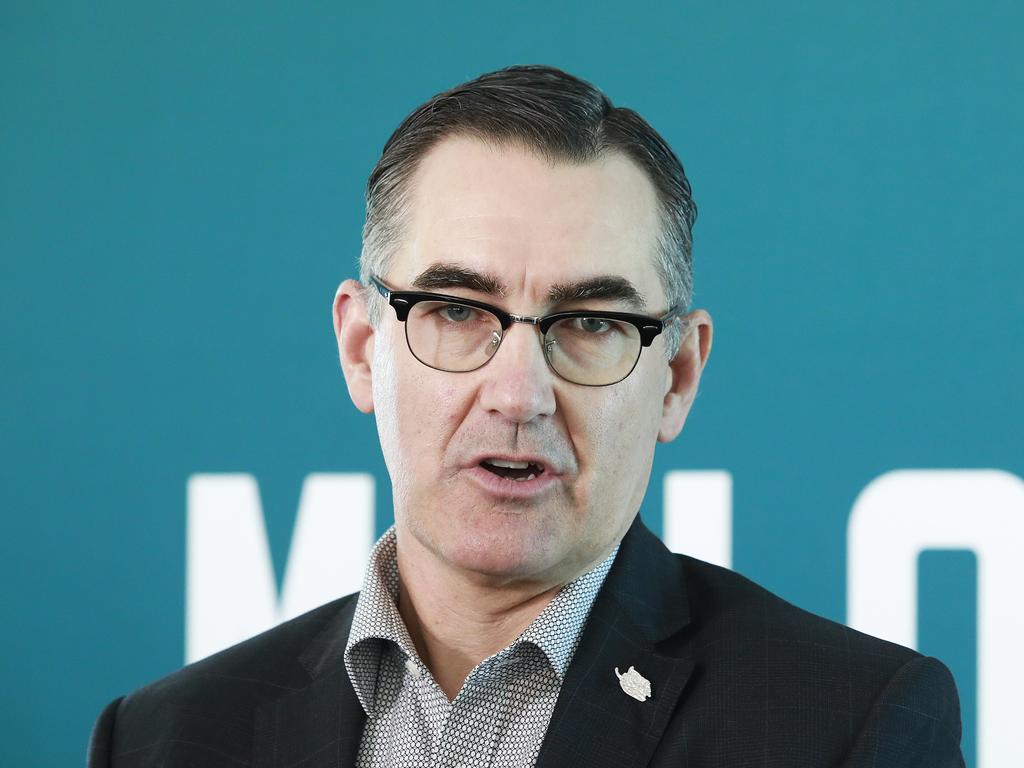
“They are the best in the business,” he said of Virgin’s staff.
“And they’re the best at what they do and they deserve to have a very bright future and that’s my intention – to make sure we create that.”
Administrator Vaughan Strawbridge from Deloitte said there were no plans for redundancies.
“They’re continuing to be employed,” he said.
“There is no plans to make any redundancies. Wages will continue to be paid and those who have been stood down and are accessing JobKeeper. The intention is to continue to make those payments available to those staff.”
Mr Strawbridge said more than 10 parties had expressed a “keen interest” in helping restructure the business.
“We have been reached out to by a number of parties, including a government adviser, a number of financial creditors and also from the Virgin brand IP and we’ve got a huge amount of support from those parties for the voluntary administration and with the intent of seeing successful restructuring come through for Virgin Australia,” he said.
Velocity Frequent Flyer is a separate company under the Virgin Group and is not in administration.
Virgin Australia is 90 per cent owned by foreign shareholders: Etihad and Singapore Airlines, Chinese conglomerates HNA and Nanshan Group, and the Virgin Group.
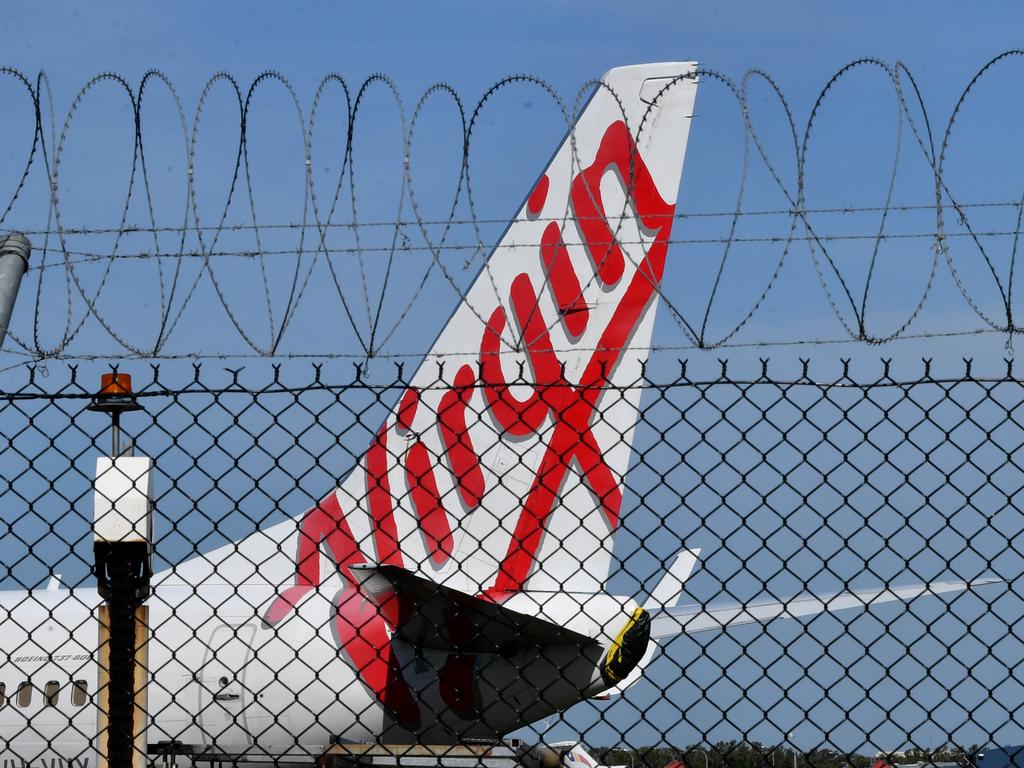
GOVERNMENT RULES OUT BAILOUT
Meanwhile, the Federal Government has defended its decision not to bail out Virgin Australia.
Speaking in Canberra this morning, Treasurer Josh Frydenberg said the administration process was “not the end of the airline” and would give it the opportunity to recapitalise and “come stronger on the other side” of the COVID-19 crisis.
“Virgin Australia is a very good airline performing a very important role and this is a difficult day for its staff, for its suppliers and for the aviation sector more broadly,” Mr Frydenberg said.
“But the government was not going to bail out five large foreign shareholders with deep pockets who, together, own 90 per cent of this airline.”
He said the federal JobKeeper package would continue to be available to Virgin workers.
“The government’s objective is to see two commercially viable airlines operating domestically in Australia,” Mr Frydenberg said.
“This will be good for jobs, it will be good for competition, it will be good for lower prices and it will be good for the Australian economy more broadly.”
Deputy Prime Minister Michael McCormack noted the Federal Government had committed millions of dollars to the aviation sector, including a $715 million relief package and the waiving of a range of fees.
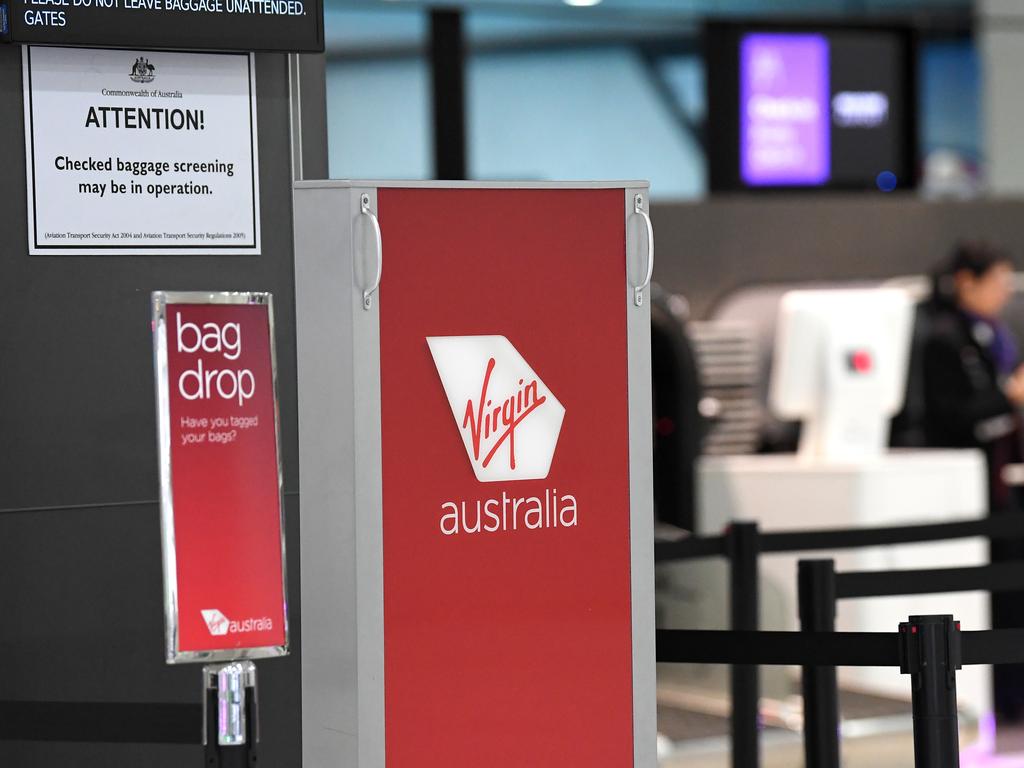
VIRGIN ENTERS VOLUNTARY ADMINISTRATION
In a statement to the ASX this morning, Virgin Australia said the decision was made to “recapitalise the business and help ensure it emerges in a stronger financial position on the other side of the COVID-19 crisis”.
“The decision comes as the group has continued to seek financial assistance from a number of parties, including state and federal governments, to help it through the unprecedented crisis, however it is yet to secure the required support,” the statement said.
“Virgin Australia will continue to operate its scheduled international and domestic flights, which are helping to transport essential workers, maintain important freight corridors and return Australians home.”
Vaughan Strawbridge, John Greig, Sal Algeri and Richard Hughes of Deloitte will work as voluntary administrators supported by Virgin Australia’s management team, led by chief executive Paul Scurrah.
Virgin Group founder Sir Richard Branson addressed the decision on Twitter and in a video message on this Instagram page.
Dear @VirginAustralia team. I am so proud of you and everything we have achieved together. This is not the end of Virgin Australia, but I believe a new beginning. I promise that we will work day and night to turn this into reality https://t.co/GJH1zhEqEd pic.twitter.com/GelLiA6DKG
— Richard Branson (@richardbranson) April 20, 2020
“I am so proud of you and everything we have achieved together,” he said.
“This is not the end of Virgin Australia, but I believe a new beginning. I promise that we will work day and night to turn this into reality.”
Sir Richard owns about 10 per cent of Virgin Australia. Abu Dhabi’s Etihad owns 21 per cent, while Singapore Airlines and Chinese firms HNA and Nanshan Group each own 20 per cent.
RELATED: Emotional Virgin staff beg for their jobs
RELATED: Sir Richard Branson demands support in open letter
Virgin Australia suspended its international operations due to the COVID-19 crisis and currently flies only one domestic service between Sydney and Melbourne.
Its subsidiary Tigerair Australia has stopped flying during the pandemic.
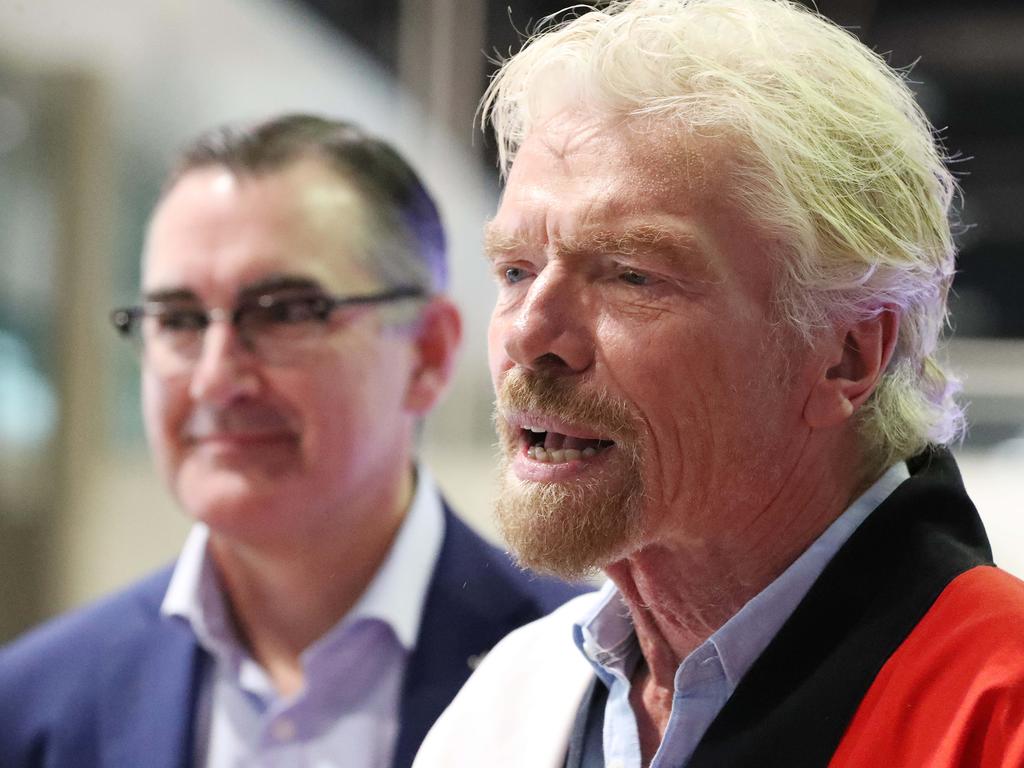
The Queensland and NSW governments had been in talks about possible bailout packages, with the NSW deal contingent on whether the Brisbane-based airline would relocate its headquarters.
In a joint statement, NSW Treasurer Dominic Perrottet and Minister for Jobs, Investment and Tourism, Stuart Ayres, said the state and nation were “best served by having a competitive aviation sector”.
“We have been in discussions with Virgin, as have other States, about their future. We will continue these discussions with the Administrators and the Federal Government.”
PM WILL BE ON ‘WRONG SIDE OF HISTORY’
Earlier today the Opposition and unions slammed the Federal Government for failing to step in and save the struggling airline.
“Scott Morrison and the government will be on the wrong side of history if they do not step up right now and do what they should have done weeks ago, and that is take an equity stake in Virgin Airlines,” Transport Workers’ Union national secretary Michael Kaine said at a press conference at Sydney Airport.
“Today, we make an appeal to Scott Morrison: It’s time to sit down with workers and workers’ representatives and figure out the pathway forward for Virgin. It’s time to send a clear market signal that the government will step up.”
Opposition Leader Anthony Albanese said Labor supported a viable two-airline system in Australia.
“We regard it as absolutely essential to Australia’s future economy,” Mr Albanese said.
“We rely upon domestic aviation to get around the country, whether it’s for work or for recreation, and Australian jobs depend on it.
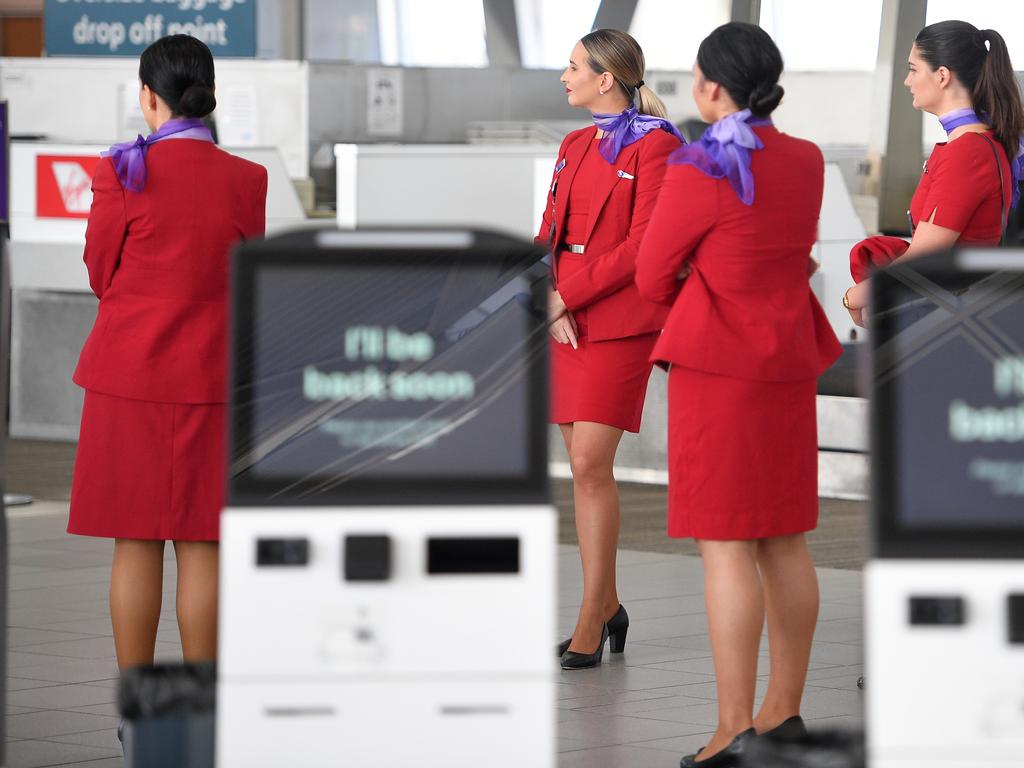
“It’s about not just the 15,000 people who depend directly on Virgin Australia for their jobs, it’s about the hundreds of thousands of Australians who depend upon tourism for their jobs. It’s about the millions of Australians who depend upon a two-airline system in order to be able to afford to get around this country.”
Gutted Virgin Australia staff described their love for their jobs as they begged the federal government to step in and save them.
“We wake up because we love our job,” crew member Flynn said at the press conference.
“Our job is our life. You have your jobs at home. This is our job. If we don’t have Virgin Australia, we are nothing.
“I see it as Virgin Australia is something like my other mother. I love it like another mother. It is family to me. Each and every person behind me, and plus another 16,000 more across the globe.”
A ground worker named Paul said he had been with Virgin Australia for almost 17 years and previously worked for Ansett.
“These people behind me, not only my mates, they’re my brothers and sisters,” he said, before directing a message at Prime Minister Scott Morrison.
“Sir, I could not do your job and I don’t envy you, but please let me do mine. Don’t clip our wings.”
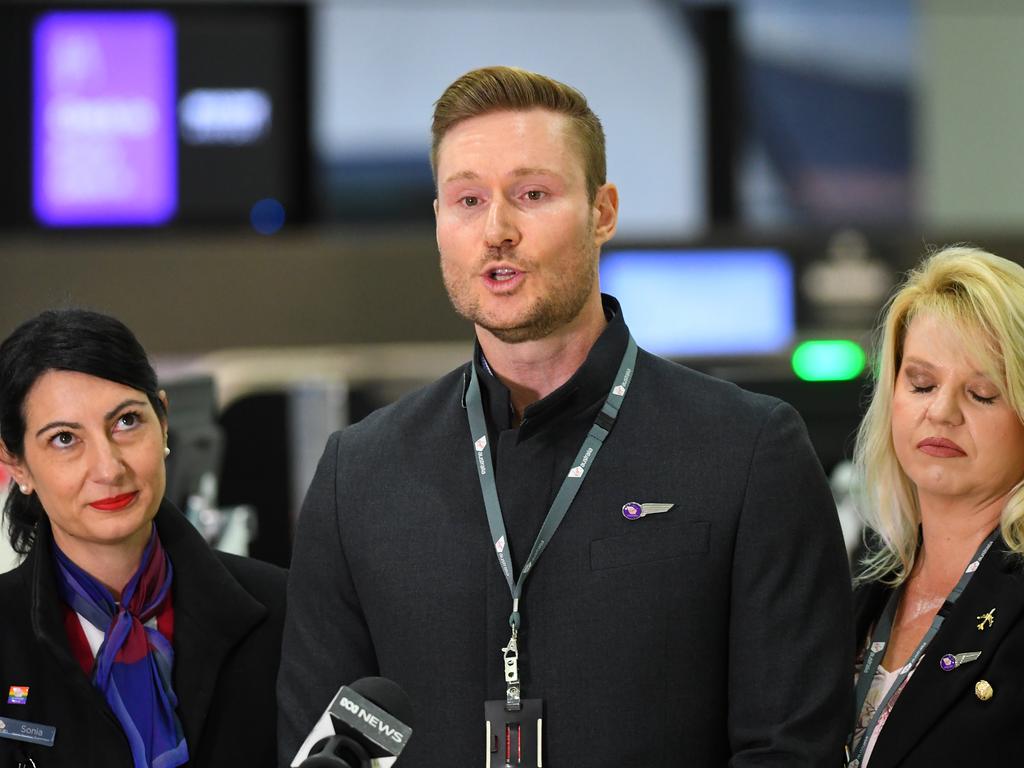
‘TERRIFYING MOMENT’ FOR WORKERS
Earlier today, Finance Minister Mathias Cormann rejected calls for the Federal Government to buy a stake in Virgin Australia but said it wanted two airlines to remain in Australia.
“The Government is not in the business of owning an airline,” Mr Cormann told ABC News this morning.
“But we do want to see two airlines continue and we believe that the opportunities (are) there out of the administration process for that to happen.”
Senator Cormann said putting the airline into administration could lead to a sustainable private-sector solution.
“It offers the opportunity for private sector interest to come forward and buy the business or assist with the recapitalisation of the business,” he said.
“There’s a lot of opportunity from here on in to ensure that there is a viable second airline in Australia moving forward.”
He said the airline’s major shareholders should be the first to step up.
The Transport Workers’ Union’s Queensland state secretary Peter Biagini said today was a “terrifying moment” for Virgin Australia’s workers.
“Being stood down was bad enough, but believing that there would be light at the end of the tunnel and being able to get back to work once the restrictions are lifted, and now that doesn’t look likely,” Mr Biagini told the ABC.
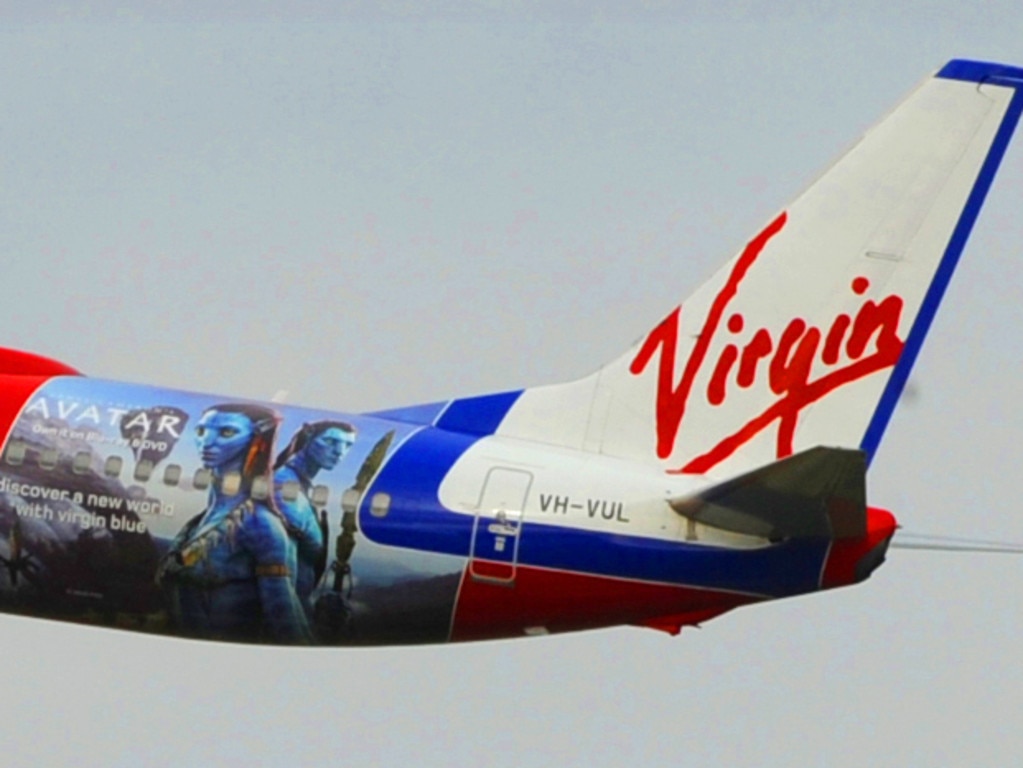
Mr Biagini refuted Federal Government suggestions a “stronger airline” could emerge from the administration process.
“I think that’s fanciful,” he said. “To think that another airline, given that it was different when Ansett collapsed — the economy was going all right, it was just badly managed, that business. This is different. This is all the airlines around the world who are struggling and getting bailouts.
“So to think that if Virgin was to fall over that another airline would just come in and fill the void — that will take years. And in the meanwhile, once we get over this virus, we need two good, strong airlines to be able to service our economy, our travellers and also our freight tasks.”
Aviation expert and editor-in-chief of Executive Traveller, David Flynn, said the administrator could make major changes to the airline that could keep it afloat, such as returning it to its budget origins.
“The administrator could, for example, cut the number of planes in the fleet. It could decide to make Virgin a much smaller, more boutique airline. It could go back to its low-cost origins of Virgin Blue,” he told ABC News.
“It could go into the middle of the market to compete against Qantas as a full-service airline and Jetstar as a low-cost airline. It could scrap all of its international flights.
“So, there are a lot of options to play with. But the end result will be to come up with a Virgin that is more efficient, more attractive. And it means that you don’t have to be a big airline to still be competitive.”


